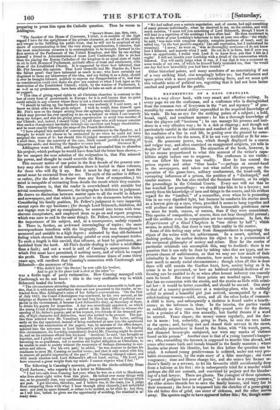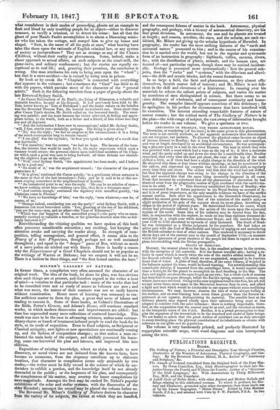EXPERIENCES OF A GAOL CHAPLAIN.
THIS is a very clever book, with very smart and effective writing. In every page we see the craftsman, and a craftsman who is distinguished from the common run of liverymen in the "art and mystery" of pen- manship by some natural ability superadded to the acquired knowledge of his trade. He has an eye for the striking points of a subject ; a bold, broad, rapid, and trenchant manner ; he has a thorough knowledge of what the players call " business " ; he can manage his persons and inci- dents in a very effective way ; he is a dab at claptrap ; and though not particularly careful in the coherence and conduct of his story, he has all the readiness of a liar in real life, in getting over the ground by some- thing which serves for the nonce, if it be not very truthful or fit for ana- lysis. He possesses power, too, which though displayed in a coarse and vulgar way, and often exercised on exaggerated subjects, yet tells in despite of taste and criticism. The attraction of the book, however, is by no means proportioned to what this account of the writer's capa- bilities might induce one to suppose. The craftsman is too visible : we can follow his traces too readily. How he has conned the prison reports and other "blue books "—perhaps at second-hand in the newspapers, and taken out what suited his purpose, on the operation of the game-laws, solitary confinement, the tread-mill, the corrupting influences of a prison, the position of a "discharged," and similar matters. He has also studied the Sessions Gazette, or its origin the proceedings in the Criminal Courts. Every one will see that he has watched law proceedings : we should take him to be a lawyer - not merely from his knowledge of men and things in the courts, and his evident regard for the " intellect " of a counsellor, even when he is presenting him in no very dignified light, but because he conducts his stories much as a lawyer gets up a case, when, provided it seems to hang together and will produce an immediate impression, the honourable gentleman cares no more for truth, reason, or nature, than if they were nonexistent. This species of composition, of course, does not bear thoughtful perusal; and the artifices even in composition are too conspicuous. In fact, the Experiences if a Gaol Chaplain is "too clever by half"; which means, in actual life, that there is very little reality in the matter.
Some of this feeling may arise from disappointment in comparing the object of the writer with his achievement. In a smart, spirited, and dashing preface, the author declares his object to be a presentation of the reciprocal philosophy of society and crime. How far the stories of particular criminals can accomplish this may be doubted : there is no question that it can only be done by taking tales that are types, and re- present classes of unfortunates, so that we may see how much of their criminality is due to innate character, how much to human weakness, how much to merely social circumstances ; though when all this is done there will still remain the Gordian knot, how, society being as it is, crime is to be prevented, or how an habitual criminal desirous of re- forming can be enabled to do so when often honest industry can scarcely earn its bread. But none of these points are touched upon. The pre- face has no connexion with the stories, and the stories as little with crimi- nal law : it would be better cancelled, and should be unread. One story is that of a country practitioner at a watering-place, who is suddenly called to attend a beautiful girl just arrived, accompanied by a dig- nified-looking woman—cold, stern, and all the other looks of romance. A child is born, and subsequently a skeleton is found under a hearth- stone; so the inference is clear. In the interim, the parties vanish as suddenly as they came, leaving a fifty-pound note for the doctor, with a promise of a like sum annually, but fearful threats if a word be uttered. Years elapse; the money comes regularly, and the doc- tor is mum : but, unluckily, going to Paris, he sees the two ladies at the opera ; and, having met and chased their servant in the street, the unlucky acconcheur is found in the Seine, with "his watch, purse, and diamond breast-pin uninjured, nor were any marks of 'violence found on his person." Another case is that of a young baronet's hanger- on ; who resembling the baronet, is supposed to murder him abroad, and years after comes back and instals himself in the family mansion ; where doubts arise about his identity, but he dies before the question can be tried. A reduced young gentlewoman is seduced, under not very pro- bable circumstances, by the stale story of a false marriage; she vows vengeance ; time and illness change her, and she enters her former se- ducer's family as a servant, to let his favourite child accidentally drop from a balcony at his feet : she is subsequently tried for a murder which perhaps she did not commit, and convicted by perjury and the blunder- ing of a bad lawyer. There are ghosts. The youngest of three spinsters, "proud of pedigree but poor of purse," is attached to a young yeoman; the elder sisters throttle her to save the family honour, and bury her in their tenement ; the lover is trepanned into the clutches of a press-gang; his old father dies of grief, one sister of sickness, and the other moves away. The spectre ought to have appeared before this ; for, though some-
what roundabout in their modes of proceeding, ghosts set an example to flesh and blood by only troubling people for an object—either to discover treasure, to terrify a criminal, or to detect his crime : but all that the ghost of poor Maude Paulet accomplishes is to alarm a Dissenting minis- ter who has taken the cottage, and compel him to give up house and chapel. "Now, in the name of all the gods at once," what bearing have tales like these upon the rationale of English criminal law, or any system of society or jurisprudence ? They are as strange as any of the Causes Ce/ebres, without their reality as phienomena. Some, indeed, make a closer approach to actual affairs on such subjects as the tread-mill, the game-laws, and solitary confinement ; but the stories are equally ex- ceptional as to real life ; and, granting their premises, the conclusion is wrong. One man attributes his ruin to being seen upon the " wheel" ; but that is a mere accident—he is ruined by being seen in prison. By hook or by crook the "Chaplain" is connected with everything that appears in the volumes ; but sometimes the "Gaol" has little to do with the papers, which partake more of the character of the "general article." Such is the following anecdote from a paper of gossip about the late Reverend Sydney Smith. "As Canon Residentiary of St. Paul's, the living of Edmonton, a valuable and desirable benefice, became at his disposal. It had previously been held by Mr. Tate, better known as Tate of Richmond '; and the senior curate en the benefice was the Reverend Thomas Tate, the learned incumbent's son. Some short time after Canon Tate's demise, Mr. Smith called on the bereaved family. The meet- ing was painful; and the more because the vibiter adverted, in feeling and appro- priate terms, to the worth, both as a father and a friend, of him whose loss they one and all deplored. "'And the information I have now to communicate,: added Mr. Sydney Smith, will, I fear, startle you—painfully, perhaps. The living is given away !
No,' was the reply; we feel no surprise at the circumstance: it is a living of too much consequence long to remain vacant.'
"'I am glad,' was the rejoinder, to hear you speak so calmly of a result that was inevitable.'
"'For ourselves,' was the answer, we had no hope. The income of the bene- fice, the interest that would be made for it, the many expectants which such a vacancy would create; the personal claims upon individual members of the Chap- ter which such a prize was sure to bring forward; all those forbade our cherish- ing, the slightest hope on the subject.'
Well, cried Sydney Smith, the appointment has been made; and I believe it to be a good one: "'No doubt of it,' was the acquiescent remark; the character of the patron tees it
guarantees ' .
"'It is given,' continued the Canon quietly, to a gentleman whose surname is the same as that of the last incumbent—Tate; and he is said to be at this mo- ment staying somewhere in the neighbourhood of London.' '
"'An immaterial point to us,' was the reply. He can be no relative of ours— we know nothing about him—nothing save this, that he is a fortunate man.' "'And curious enough,' continued the dignitary with unruffled gravity, his Christian name is Thomas.' "'We have no knowledge of him,' was the reply, 'none whatever,—nor he, of course of us.'
"Strange indeed, considering you are the party!' cried Sydney Smith, with a humorous but most benevolent smile. You,' glancing at the son of his old friend, you are the man—you, and no other—the Vicar of Edmonton!'
Which was the happiest of the assembled group 7—the party who so unex- pectedly received so valuable a benefice, or the generous-hearted man who so deli- cately bestowed it?"
• Notwithstanding the vitiating qualities we have spoken of, this book often possesses considerable attraction not exciting, but keeping the attention awake and carrying the reader along. In strength of com- position, telling management, and general effect, it seems akin to the Diary of a late Physician, though perhaps not so well sustained throughout ; and equal to the " deeper " parts of Boz, without so much of a mere police air tricked out with finery. There is hardly a reason why the Experiences of a Gaol Chaplain should not be as popular as the writings of Warren or Dickens ; but we suspect it will not be so. There is a fashion' in these things, and "the first hound catches the hare."



























 Previous page
Previous page